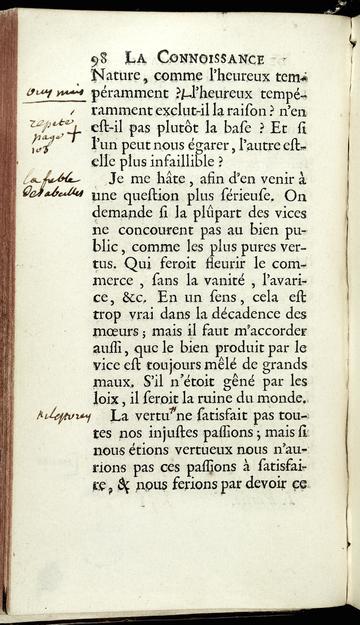Voltaire’s Worlds of Publication: Manuscript – Print – Digital

Luc de Clapiers, marquis de Vauvenargues, Introduction à la connaissance de l’esprit humain (Paris, 1746), p.98, with marginalia by Voltaire. The annotated copy is in Aix-en-Provence, Bibliothèque Méjanes: Fonds patrimoniaux, Rés. D. 17.
Supervisor: Professor Nicholas Cronk, Faculty of Medieval and Modern Languages
Voltaire dominated the European Enlightenment through his mastery of the print medium: no other thinker of the eighteenth century was responsible for so many printed books in so many different countries. But, more importantly, his dominance was also due to his mastery of publication beyond print, to his strategic use of manuscript publication, in the tradition of the French clandestine manuscript. Voltaire uses the manuscript form to publish works which for reasons of censorship he cannot publish in print; he sometimes uses manuscript in parallel to print; at other times he uses manuscript instead of print, notably in the context of his voluminous correspondence; and he also combines manuscript with the printed object, for example when he makes gifts to friends of personally annotated copies of his printed works. Whereas the other philosophes are essentially writers of the printed word, Voltaire is unique in his period in juxtaposing manuscript and print so as to reach different audiences and so as to maximise the impact of his message. This topic remains almost wholly unexplored.
Oxford has unmatched human and library resources for carrying out this project. The Bodleian Libraries, including the Voltaire Room at the Taylor Institution Library, have one of the world’s leading collections of Voltaire’s books and manuscripts. The Voltaire Foundation, whose primary focus for the last fifty years has been the publication of the Complete works of Voltaire, has a highly trained editorial team and maintains close links with all the world’s leading Voltaire scholars. The Complete works of Voltaire edition will be completed in 2020: this means that the doctoral student working on this project will have at her/his disposal, for the first time, an extended support network of specialists and a fully scholarly edition of all of Voltaire’s writings, allowing unprecedented in-depth analysis of the full variety of Voltaire’s publication techniques.
From 2019, the Voltaire Foundation is scoping the possibilities of digitizing the 200 paper volumes of the Voltaire edition (in a project funded by the Mellon Foundation). The goal is not simply to digitise the paper books, but to research the optimal ways of taking the editions beyond print so as to reimagine the edition as a digital object, both for reference and for research. As we build this resource, we have a golden opportunity to rethink and re-present Voltaire’s print and manuscript strategies. The doctoral student, who is eligible to seek further training from the Digital Humanities Summer School, will be integrated into this project. She/he will contribute to the conception and construction of the digital edition, and her/his research findings will be incorporated within it.
Application process
Applicants should apply for the DPhil in Medieval and Modern Languages by 10 January 2020. Applicants should have a Master’s degree in French, ideally first class or good 2.1, as well as first experience with editorial work and working in digital humanities. An interest in scholarly critical editing, publishing, and publishing history would be of advantage.
The scholarship will cover course fees and provide a living allowance at Research Council rates. Candidates from all backgrounds are welcome to apply, although the Leverhulme Trust has a preference for supporting Home/EU candidates.
Applicants should note that the application process for a place on the DPhil course is a separate process to being considered for the Leverhulme scholarship, so you may initially receive an offer of a place on the DPhil. However, this does not mean that you will automatically receive the scholarship. Offers for the scholarship itself will be sent to successful applicants separately, shortly after the offer of a place on the DPhil.


